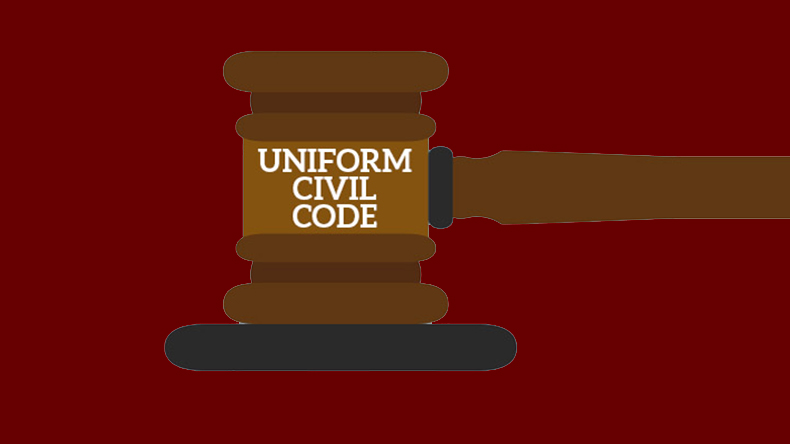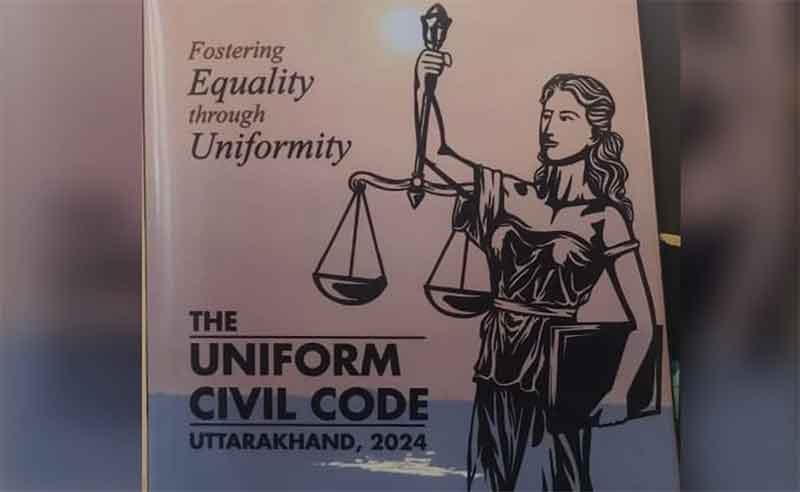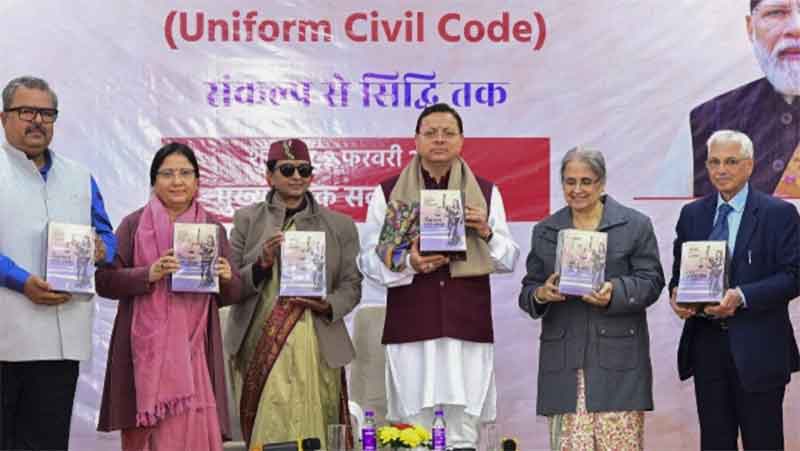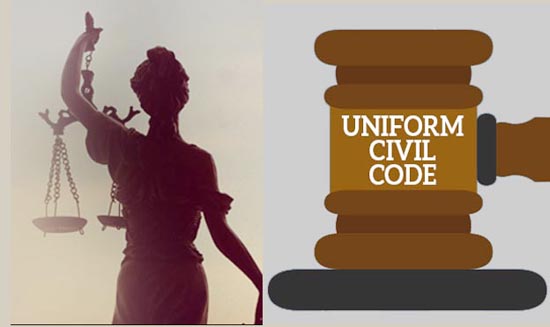Proposals of the GASS before the 22nd Law Commission of India with regard to Implementation of Uniform Civil Code

The role of the Law Commission of India is to consult as many people of the country as possible and make proposals to the government before making any law for the country. If the government wants, it will accept it and introduce it in the form of a bill in Parliament. The Law Commission of India felt it appropriate to enact a Uniform Civil Code (UCC) and invited suggestions from the people of the country for the same. The Law Commission has extended the last date of inviting proposals to July 28 after millions of proposals came in from different parts of the country.
There are various written personal laws for different believers. The purpose of the UCC is to create a single rule by removing all these variations. The Uniform Civil Code is a proposal in India to formulate and implement personal laws of citizens which would apply on all citizens equally regardless of their religion, gender and sexual orientation. The UCC is based on the premise that there is no connection between religion and law in modern civilization. At present, the personal laws of various communities are largely governed by their respective religion.
While all disputes of Hindu, Sikh, Buddhist, Jain families are resolved by the Hindu Personal Law, disputes of Parsi, Christian and Muslim families are resolved by the Personal Law framed under their own system of religion. Adivasi societies (Koya Samaj and Gond Samaj etc.) resolve all those disputes by their own prevailing but unwritten rules.
The Preamble of our Constitution implies inter alia, that “all the citizens of the country as well as their elected representatives work to make India a sovereign, socialist, secular, democratic republic”. Secularism means that the government will prepare a plan to establish a society of equality and justice over and above any caste, religion and creed by removing the prevailing dogmatic traditions, caste systems and unscientific ideas in the name of religion within the society. That’s why Article 44 of the Constitution corresponds with Directive Principles of State Policy mandates the State to “endeavour to secure for all its citizens a uniform civil code (UCC) throughout the territory of India. However, since the article comes under the Directive Principles of State Policy, they are regarded as only guidelines and it is not mandatory to use them.
Just before Independence of our country, even though the members of Constituent Assembly felt the need for a uniform civil code during the drafting of the Constitution of India, many hard-core religious fanatic members also opposed the same civil code. Without a consensus, the same provision was laid down in Article 44 of the Constitution, keeping any eye that the government may enact the same civil code at any time in future. But the Constitution clarified that UCC was non-enforceable through courts. Later, Ambedkar introduced the Hindu Code Bill (to codify and reform the Hindu Personal Law) in Parliament in 1951. Ambedkar resigned from the Congress cabinet after some Hindu religious bigots opposed it, on the grounds that it incorporated provisions of Western ideology. However, later the Hindu Personal Code was split into four separate bills and between the years 1952 and 1956 these bills were reintroduced and passed. They are the Hindu Marriage Act, 1955; the Hindu Succession Act, 1956; the Hindu Minority and Guardianship Act, 1956 and the Hindu Adoption and Maintenance Act, 1956. These laws apply to all Hindus, defined expansively to include Jains, Buddhists and Sikhs.
But the demand for a UCC never died down. The courts have been quite clear about a UCC on several occasions. The Supreme Court, from the Shah Bano case (1985) to the Shayara Bano case (2017), has on several occasions directed the Central government to enact laws that suit the uniform civil code. The Supreme Court of India has delivered several landmark judgments based on the Hindu Personal Act, that have improved the condition of Hindu women. In January 2022, the Supreme Court conferred daughters with equal right to father’s property even prior to codification of Hindu Personal laws and enactment of the Hindu Succession Act in 1956. In August 2020, the Supreme Court gave Hindu women the right to be coparceners or joint legal heirs in the same way a male heir does if the father died before the Hindu Succession (Amendment) Act, 2005. However, how far these verdicts are being implemented in practical field is a different matter. Moreover, the Supreme Court has been directing the Central government to enact a uniform civil code as there are some exceptions in the case of women of other religions and women who have married in different religions
In the month of October, 2022 Centre filed one affidavit on Uniform Civil Code in the Supreme Court and therein it said the expression “Uniform Civil Code denotes the fields of personal law relating to marriage, divorce, maintenance, custody and guardianship of children, inheritance and succession and adoption”.
The Prime Minister also felt the need for a UCC. He called upon everyone to become a member of one family forgetting the discrimination of religion, language and caste. That’s why he addressed his party workers at the “Mera Booth Sabse Majboot” programme organised by the Bharatiya Janata Party (BJP) in Bhopal and said, “The entire country is one family. Why should there be different rules for the members living in the same family? There should be one rule for all the members of a family.” But why did the Prime Minister preferred to raise such a very important Constitutional issue while addressing BJP workers instead of discussing the same inside Parliament? At the same time, why did he prefer not to divulge what would be the contours of the UCC before his party workers?
The BJP’s religious intolerance and its intention of converting India into a Hindu Rashtra have made the proposal of UCC controversial and disputed. With general elections (Lok Sabha Polls) due next year, many people doubt the credibility of the BJP’s intention behind this proposed UCC and also apprehend whether the party is playing the trick of division on the basis of religion again !. Till date, the Sangh Parivar has triggered a series of violence by terming the practice of polygamy among Muslims as” a cause of rise in population and a threat to Hinduism”. However, according to the The National Family Health Survey 2019-21 (NFHS-5), so far polygynous marriage in India is concerned, 1.9 per cent of Muslim women said their husbands were married for the second time, while 1.3 per cent Hindu women said their husbands were married for the second time. The report further mentions that between 2005-06 and 2019-21, the practice of polygamy has been declining across all religions. However, the BJP does not mind for ‘selective attack’ on Muslims and is blaming the minority religious community for increasing the country’s population while polygamy is an issue that goes across several communities including tribals and it is certainly not unknown to Hindus.
The culture of Hindus has always been presented as culture of India. In this form of ‘religious majoritarianism’, religious rituals are recognised as culture of a nation and as a result, the caste system in the society is still more prominently noticed. The present government is more concerned of protecting Hindu religion. This is why large number of democratic rights organisaitons and activists are apprehensive about the intention of the present government. They feel, would it not bring Hindu majoritarian views in name of UCC ? If it happens, then dalits, adivasis and well as believers of Muslim, Christian and Parsis etc will feel alienated from the country. This will be a big jolt to ethics and principles of democracy.
On February 2006, a Division Bench of the Supreme Court, in Smt. Seema vs Ashwani Kumar held that, “marriages of all persons who are citizens of India belonging to various religions should be made compulsorily registrable in their respective States, where the marriage is solemnized” and accordingly passed directions to the Centre and the States. Gradually, due to this compulsory registration effort, there has been some respite relating to the inhuman traditions of minor girl marriages, marriages against the wishes of women, polygamy, right to alimony of women, arbitrary marriages, leaving the married women behind and again marrying elsewhere. However, that is not enough.
The Hindu Marriage Act requires a boy and a girl to be a major. But it is not explained why the girl is allowed to marry early ( at the age of 18 years) and the boy a bit later (at the age of 21 years). The Muslim Personal Law do not treat the women at equal footing with the man even today. Muslim women are still deprived of many rights. In Islam, there is a system of child marriage. While separation and remarriage are easier for Adivasi women, there is no specific law regarding maintenance.
In this regard, ‘GAAS’ is placing some proposals before the Law Commission of India and the Central Government:-
- The Law Commission of India, before seeking the opinion on the Uniform Civil Code, should prepare a draft proposal on its own and invite the opinion from people in this regard.
- While making UCC the objective should be there to remove gender discrimination in all religions.
- 3. Protection of tribal property should be ensured during the formulation and implementation of the uniform civil code.
- 4. Since this is a very sensitive issue, the Central Government should discuss this issue at length in Parliament and Then the government should formulate a uniform Civil Code with the consent of all, instead of giving importance to majoritarianism.
- 5. Since the country is a secular country, religious traditions should be counted as personal matters and all social activities of the public should be freed from the influence of religious institutions. The government should take necessary steps in this regard.
- 6. At first, compulsory Registration should be made mandatory for marriages of all persons who are citizens of India belonging to various religions. In order to eradicate the caste system in the society, long-term plans should be prepared to make the needs of Brahmins secondary in social events like marriage. The same thing should be applicable to all religions.
Above given proposal is based on limited experience of the GASS. The Central Government should prepare a detailed draft for a uniform civil code covering its various aspects considering the sensitivity and in-depth study involved of various personal laws governing different communities and invite the opinion of the people of the country for the same.
For communication write to :
Deba Ranjan,
Golak Bihari Nath
GANATANTRIK ADHIKAR SURAKSHA SANGATHAN, Odisha
Email: [email protected]













































